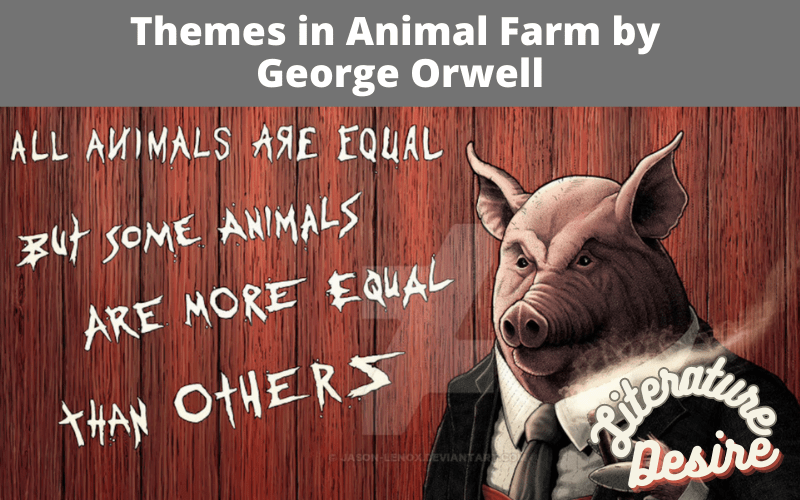“Animal Farm” by George Orwell is a timeless allegorical novella that serves as a scathing critique of totalitarianism and a powerful commentary on human nature and political corruption. There are several Themes in Animal Farm by George Orwell.
First published in 1945, Orwell’s masterpiece employs a seemingly innocent and relatable setting—a farm—and anthropomorphized animals to represent the political upheavals of the Russian Revolution and the subsequent Soviet Union under Joseph Stalin.
Advertisement
Through vivid storytelling and rich symbolism, Orwell unveils the gradual transformation of Manor Farm into a dystopian society where the pigs, led by the cunning and manipulative Napoleon, exploit and oppress the other animals.
Advertisement
Orwell masterfully employs animals as symbols to represent different political figures, ideologies, and societal dynamics, offering a scathing commentary on the Russian Revolution and the rise of Stalinism.
Advertisement
Major Themes in Animal Farm by George Orwell
Corruption of Power
One of the central themes in “Animal Farm” is the corruption of power. The pigs, led by the cunning Napoleon, gradually abuse their authority and bend the principles of Animalism to serve their own selfish interests.
Advertisement
This theme reflects the corrupting influence of power in real-world political systems.
Class Struggle and Social Inequality
Another significant theme is the class struggle and social inequality. Initially, the animals strive for a society where everyone is equal, but over time, a hierarchy emerges, with the pigs at the top.
This mirrors the struggles between different social classes in human societies, highlighting the inherent disparities and injustices that arise.
Manipulation and Propaganda
Orwell explores the theme of manipulation and propaganda as a means for those in power to maintain control.
The pigs use propaganda and manipulate language to control the narrative and justify their actions.
This theme serves as a warning about the dangers of misinformation and the importance of critical thinking.
Loss of Individuality and Freedom
As the pigs consolidate their power, the animals on the farm experience a loss of individuality and freedom.
The rules and commandments of Animalism are gradually altered to suit the pigs’ desires, stifling the individual voices of the other animals.
This theme highlights the consequences of sacrificing personal liberties for the sake of collective ideals.
Revolution and Betrayal: Themes in Animal Farm
The theme of revolution and betrayal is prominent in “Animal Farm.” The animals overthrow their human oppressors in the hope of creating a fair and just society.
However, the pigs betray the principles of the revolution, revealing the fragility of idealistic movements and the potential for corruption within them.
Dystopian Society: Themes in Animal Farm
George Orwell presents a dystopian society in “Animal Farm” where the initial vision of equality is replaced by oppression and tyranny.
This theme reflects the dark side of human nature and warns against the dangers of unchecked power and authoritarianism.
Human Nature and Animal Instincts
By using animals as characters, Orwell explores the complexities of human nature and the primal instincts that drive our actions.
The animal characters in the story embody different traits and behaviors, shedding light on the inherent characteristics that shape human society.
The Importance of Education and Knowledge
Education and knowledge play a crucial role in “Animal Farm.” The pigs, with their superior intelligence, manipulate the other animals due to their lack of education.
This theme underscores the significance of an informed and critical populace in resisting oppression and maintaining a just society.
The Role of Language and Communication
Language and communication are powerful tools in “Animal Farm.” The pigs manipulate language to distort the truth and control the other animals.
This theme emphasizes the importance of clear and honest communication to prevent the manipulation of information for personal gain.
Historical Parallels and Satire
“Animal Farm” parallels historical events and figures, particularly the Russian Revolution and the rise of Soviet totalitarianism.
Through satire, Orwell criticizes the abuse of power and highlights the dangers of ideological fanaticism and autocracy.
Idealism and Utopian Dreams
The initial vision of a utopian society drives the animals’ revolution. However, the theme of idealism explores the challenges and complexities of implementing romantic ideals in the face of human flaws and external pressures.
Justice and Equality: Themes in Animal Farm
Justice and equality form the foundation of the animals’ revolution. However, as the pigs consolidate power, these principles are eroded, revealing the fragility of justice in the face of corruption and greed.
Loyalty and Betrayal
The theme of loyalty and betrayal is prevalent in “Animal Farm.” Some animals remain loyal to the principles of Animalism, while others succumb to the allure of power and betray their comrades.
This theme explores the complexities of loyalty and the consequences of betrayal.
The Absence of Trust: Themes in Animal Farm
As the pigs consolidate their power, trust among the animals diminishes. This theme highlights the destructive effects of suspicion and mistrust within a society, leading to divisions and the erosion of unity.
Allegory and Symbolism
“Animal Farm” is a symbolic work rich in symbolism. The various characters and events represent real-world figures and historical events, allowing readers to interpret the story on multiple levels.
Frequently Asked Questions
While “Animal Farm” is often categorized as a children’s book, it contains complex themes and political allegories that may be more suitable for older readers who can grasp the deeper meanings and historical parallels.
The pigs, led by Napoleon, represent the ruling class and symbolize the corrupting influence of power. They manipulate the other animals and distort the ideals of the revolution.
Yes, “Animal Farm” is highly applicable to real-world events today. Its themes of corruption, manipulation, and the erosion of democratic principles can be observed in various political contexts.
“Animal Farm” uses satire to mock and criticize political systems and figures. Through humor and irony, Orwell exposes the flaws and hypocrisies of those in power, encouraging readers to question authority.

